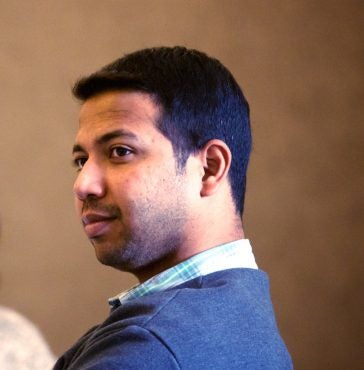 Two years after the worst oil spill in U.S. history sent 200 million of gallons of oil into the Gulf of Mexico, Nigel D’souza (then a postdoctoral researcher at Columbia University), was among a consortium of U.S scientists studying the spill’s impact on the ecosystem. Now a postdoctoral fellow in aquatic microbial ecology at the University of Rhode Island Graduate School of Oceanography, D’souza studies plankton, the tiny floating plants, animals, and other organisms that are essential to ocean food webs.
Two years after the worst oil spill in U.S. history sent 200 million of gallons of oil into the Gulf of Mexico, Nigel D’souza (then a postdoctoral researcher at Columbia University), was among a consortium of U.S scientists studying the spill’s impact on the ecosystem. Now a postdoctoral fellow in aquatic microbial ecology at the University of Rhode Island Graduate School of Oceanography, D’souza studies plankton, the tiny floating plants, animals, and other organisms that are essential to ocean food webs.
His research at URI focuses on microscopic predators (“grazers”) that consume phytoplankton – more specifically, on developing techniques to assess predation. These new methods will allow researchers to study how those grazers behave and how they might respond to environmental changes like climate change or oil spills.
“Phytoplankton produce more than half the oxygen on the planet, and are one of the largest consumers of carbon dioxide on Earth,” said D’souza. “Our goal after the oil spill was to assess how deep water releases of oil and/or natural gas affect phytoplankton.” One of the key components influencing how the microbes respond to oil was predation by microscopic grazers, and this is what brought D’souza to his current project at URI.
It was during his four years researching the spill’s impact that he became keenly aware of the enormous disconnect between scientists and those locals who were immediately affected by the spill. D’souza recalled jargon-filled, terminology-laced conversations with people from non-scientific backgrounds who really just wanted to know if the food was safe to eat or if it was safe to swim in the water.
“As a researcher holed up in a lab, I know what matters to me and my collaborators from an academic or scientific point of view, but I don’t know what my neighbors care about, what the guy who owns the store across the street cares about,” said D’souza. “If I’m doing something in the lab and it means nothing to anyone else, then what’s the point of doing it in the first place?”
D’souza’s desire to bridge that gap by engaging people from outside of academic circles in his research motivated him to attend two Metcalf science communication programs supported by Rhode Island NSF EPSCoR. One workshop, Writing for Influential Audiences, held in July, 2016, gave him the skills and confidence to draft an opinion piece advocating for new environmental regulations and policies to prevent future oil spills.
“I had not a clue how to write an op-ed until I attended that workshop and gained new insights and ideas,” he said “It was very useful.”
As D’souza continues to improve his science communication skills, he believes the most powerful way to effect change is with “a broad constituency of informed voters telling their representatives that certain issues need to be acted on in a certain way,” he said. “I would like to make my research more accessible to the public and help them make educated, well-informed decisions that would affect policies in the future.”
Read More Alumni Profiles